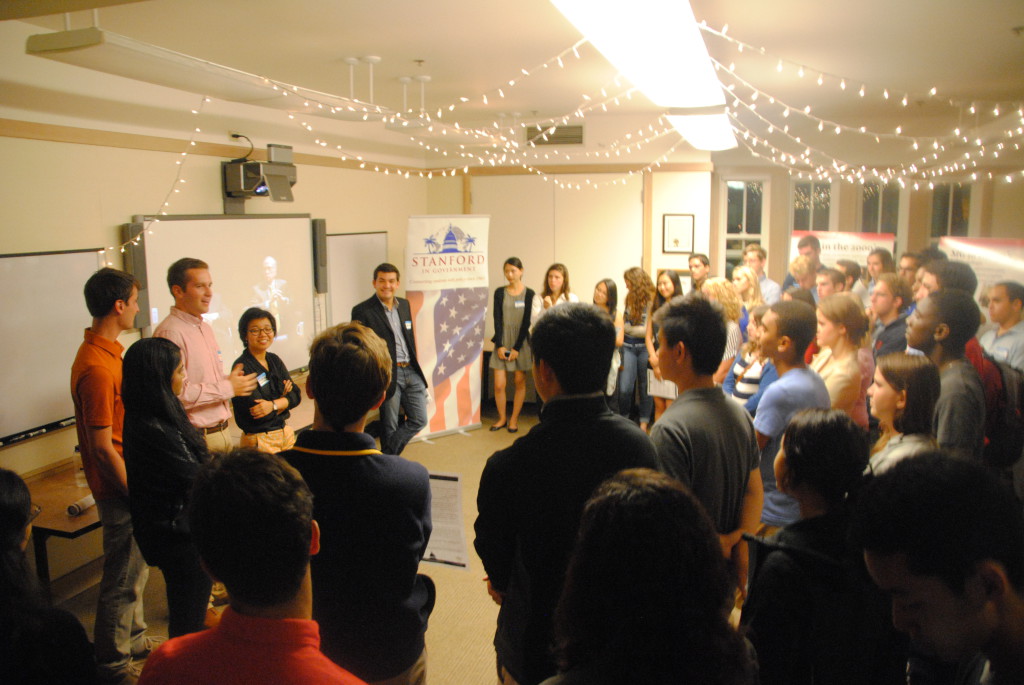Stanford in Government creates a culture of civic and political engagement on the Stanford campus by offering programming for Stanford students to pursue public policy. Stanford in Government (SIG) believes that direct public service plays an important role in communities, but that institutional reform fundamentally changes structures and systems. To inspire students to help enact institutional reform, SIG funds more than 60 policy fellowships each year at public service organizations, runs civic engagement education initiatives, and connects students with opportunities to engage with policymaking.
Stanford in Government was founded in 1963 as the Stanford in Washington program, and in 1985 became a founding program of the Haas Center for Public Service. For the last 30 years, SIG has been a key part of the Haas Center’s public policy pathway for public service and offers programming and internships through local, state, national and international opportunities in government.
In keeping with the University’s founding principles, the SIG community ensures Stanford students continue to contribute to government service. SIG also reflects Stanford’s hallmark entrepreneurial spirit with its completely student run programming—a characteristic that sets it apart from similar organizations at peer institutions. Stanford in Government is an organization that creates government service opportunities so that students, in Jane Lathrop Stanford’s words, “will become thereby of greater service to the public.”
SIG’s valuable alumni network contributed testimonials in advance of the 50th anniversary of Stanford in Government in 2013.
By May K. Chiang and Michael Ortiz
In the winter of 1963, two Stanford students, Jamie Hunter and Armin Rosencranz, started an unpaid summer internship program in Washington, D.C. with members of Congress. The idea originated with Jamie Hunter, a recent graduate of Yale and a Stanford law graduate in 1964. According to the Stanford Daily and the Stanford Alumni Magazine, Hunter was encouraged by his grandmother to establish a program offering opportunities to Stanford students to gain valuable experiences and knowledge by interning with members of Congress. Hunter approached Stanford Alumni Association Director Bob Pierce and Associate Director Julia Hirsch (’60) for advice. They provided office space and support. Hunter then approached the student body president, Armin Rosencranz, who decided to travel to Washington with a ticket purchased by the ASSU. After a week of knocking on Congressional doors, Rosencranz was able to arrange summer internships with five senators, including Frank Church (’47), Lee Metcalf (’36), and Phil Hart, and with nine U.S. Congressmen. Some of the internships were paid, although most were not.
Read more on SIG’s forty-year history.
.
By Chuck Ludlam (SIG intern, 1965 and 1967)
Seated next to Secretary of State Dean Rusk at a briefing that summer day in 1967, I wondered how he would respond to the question that was consuming me. As organizer of the briefing, one of six that Stanford in Government[1] held with Cabinet members that summer, I faced a complicated situation. Rusk was the leading Administration defender of the Vietnam War. As early as 1964, I had turned strongly against the war and had organized an anti-war protest at my Stanford graduation several weeks earlier. I saved my question for last: “In Vietnam, isn’t the United States taking sides in a civil war and acting like a colonialist?” Rusk glowered at me, responded perfunctorily, and stomped out of the room. Mine was a fair question and his, a dismissive response. It was one of those encounters that made a lifelong impression on a lowly intern. I felt powerful and relevant, feelings that have led to my 32-year career in government and public policy and my boundless gratitude to SIG.
Over the past four decades SIG interns have had thousands of such encounters. We cannot measure what these experiences have meant — for the interns, the government, and Stanford — but we suspect that the cumulative impact has been profound on all three fronts.
